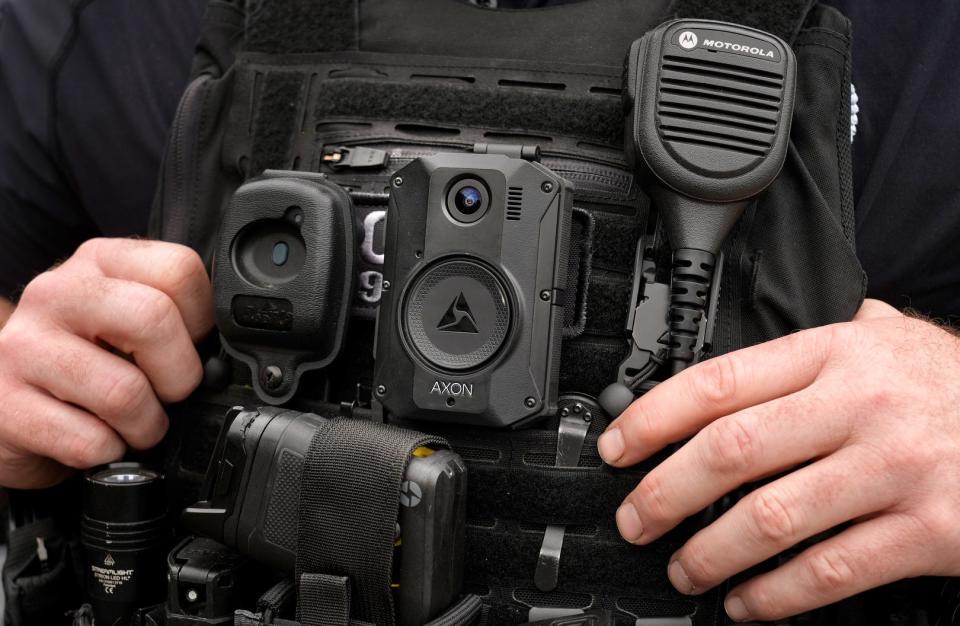Why police and state agencies are opposing updates to RI's public records laws
Government agencies aren't exactly lining up to support a slate of bills that would improve transparency by updating Rhode Island's public-records laws.
Instead, the Rhode Island State Police, Department of Corrections, Department of Environmental Management Department of Revenue and Executive Office of Commerce have all expressed concerns about specific aspects of the legislation — as have the Rhode Island Police Chiefs' Association and the League of Cities and Towns.
Here's a look at the key sticking points.
More: A new bill would expand RI's APRA law. Here's what could become public record.
Internal police investigations
H 5442 states that "any reports of investigations conducted by internal affair units or their equivalent, regardless of how or by whom the investigation was initiated, shall be public records."
The Rhode Island State Police, R.I. Police Chiefs' Association, and R.I. League of Cities and Towns oppose the bill. Internal affairs records are the equivalent of personnel files, which would not be a public record if they belonged to other public employees, they argue.
Sidney Wordell, the head of the Police Chief's Association, said that police departments were already struggling to recruit new police officers "because of the scrutiny that is placed on them."
Rep. Edith Ajello, a co-sponsor of the bill, countered that police are unlike other public employees because they have guns and the power to conduct arrests.
"Teachers don't have that power," she said. "No other public employee has that power."
The Department of Corrections voiced concerns that the bill's use of the term "law enforcement" would mean that it also applies to correctional officers.
"There could be an accusation against a staff member or inmate that warrants investigation but upon investigation is deemed unfounded or unsubstantiated," wrote acting director Wayne T. Salisbury, Jr. "Publicizing initial reports could be detrimental to the character of anyone wrongly accused."
Additionally, the legislation would make it harder to conduct internal investigations, the agency said: "If individuals know their statements are subject to public disclosure without protection or privacy, they will not come forward and/or speak the truth."
Body-camera videos
H 5454 would establish that footage from body cameras is a public record and require that "any recordings of incidents involving police use of force shall be publicly available within thirty (30) days in full or redacted form notwithstanding the presence of an ongoing investigation into the incident."
Col. Darnell Weaver, the head of the Rhode Island State Police, contended that releasing footage before an investigation is complete would "hinder the investigation and potential criminal prosecution," and raise questions about whether the investigation was "fact based."
More: Should police wear body cameras in schools? Why the issue has become a battleground.

The New England First Amendment Coalition and ACLU of Rhode Island, among others, said that the proposed changes would lead to more accountability and transparency.
Justin Silverman, the executive director of NEFAC, cited the example of Providence police sergeant Joseph Hanley, who in 2021 was convicted of beating a handcuffed suspect. He noted that the Providence Police Department had refused to release body camera footage after the incident took place. Instead, Rep. Jose Batista, the former head of the police oversight board, released the video himself and was subsequently fired.
Redacting documents
Under H 5454, government agencies that are withholding documents or redacting a portion of a document would also be required to "identify each document withheld; state the statutory exemption claimed; and explain how disclosure would damage the interests protected by the claimed exemption.”
That aspect of the bill proved to be a shared point of concern for the DOR, DEM and Commerce, whose leaders all said that it would require additional time and effort.
"Although DEM doesn’t object to this idea conceptually, our concern is that we don’t have the staff resources available to maintain such a log for the many APRA requests we receive," wrote DEM director Terrence Gray.
The bill would also prevent public bodies from charging for the time that they spend redacting documents.
Jane E. Cole, the acting director Department of Revenue, wrote that eliminating the ability to charge could "could lead to personnel conducting a less careful review" and lead to "the disclosure of information that should not be disclosed."
"Redacting documents is one of the most time-consuming aspects of responding to an APRA request," Gray said. "Eliminating the ability to cover a portion of the cost associated with this work by charging the requestor means that DEM and other agencies will have to use resources intended for other important programs to handleredactions."
Additional testimony in favor of the slate of bills came from Common Cause Rhode Island and the publishers of Uprise RI and East Bay Newspapers.
This article originally appeared on The Providence Journal: RI bill to make body cam footage public record draws opposition from police

